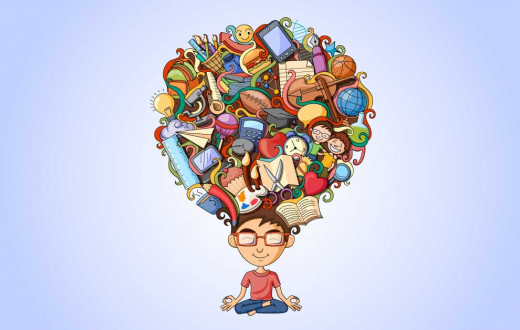
Is the behavior of your child or teen worrying you as the pandemic extends? Are they becoming angry, frustrated, difficult, aggressive, lonely, depressed, or just unlike themselves? The mental health of children and teens has caught the world's attention as children have been forced to lead a very isolated life during the pandemic. Without regular school and playtime, they have been leading a very unnatural life. Childhood and adolescence are fundamental stages of life and form the basis of understanding and development in children, after all, and schools play a huge role in shaping the personality and thinking of children and adolescents.
To understand the impact of Covid-19 on children's mental health, look at what they are missing today. No face-to-face classroom sessions, no playing with their friends, no outdoor activities, no birthday parties, no get-togethers - all the things that make childhood interesting and fun have been cut down or banned altogether. What began as a few weeks of canceled exams and classes have stretched to an indefinite sentence of house arrest that has crossed one whole year for our growing youth.
What are our children and teens thinking? Have they adjusted to being at home? Have their young minds been able to understand what they are missing? Let's find out what the psychological effect of Covid-19 is on your child(ren)’s health. And then, see what we can do to protect the fragile mental makeup of our children and adolescents.
Research on the mental health of children during the pandemic
Research studies show that the mental health of these sections of children are most affected by the pandemic:
Infected children who have to be isolated have found it very difficult to be apart from their parents and caregivers.
Children and adolescents from lower socioeconomic conditions have been affected as they depend on schools (which are now closed) for food.
Surveys on the mental health of children during the pandemic
In an online survey done on 8,079 students who were 12-18-year-olds in China, it was found that the prevalence of depressive symptoms was 43.7 percent, anxiety symptoms 37.4 percent, and both depressive and anxiety 31.3 percent. Those who knew more about preventive control were likely to be less depressed. Children with a parent in psychological distress were more likely to have a probable mental health problem.
In England, a study showed that probable mental health conditions rose from 10.8 percent in 2017 to 16 percent in July 2020 across all age, sex, and ethnic groups.
In China, an online questionnaire survey was conducted on 359 children and 3,254 adolescents who were 7-18 years of age. It showed 22.28 percent of youth were suffering from clinical depressive symptoms, which is higher than the 13.2 percent general prevalence of depression in youth in China.
Let’s listen to what parents have to say about their children's behavior during the pandemic.
“My infants have not seen other people besides me, their dad, and the nanny. I don’t know how they will react when they learn there are more people living on earth! Yesterday, they saw a dog and today I was able to spot a cow grazing at a distance. My daughter was quite thrilled at these new sights. I don’t expect this situation to ease up for a few years. Will they ever go to playschool and be able to adjust with other children?”
- Tuhina, parent of twin 1-year-olds
“With schools being shut for over a year, my children have become socially awkward. I find them slightly withdrawn during those one-off meetings with their friends online. My daughter has become moodier. They don’t even want to come for a drive anymore. Of course, now we are not even allowed to go on one.”
- Vanitha, parent of 13 and 6-year-olds
“My children are in sore need of exercise but they are refusing to go for a walk outside because of Covid-19 fears. They also warn me to avoid going out anywhere. As they have been stuck indoors for a year, they have become more introverted than before.”
- Pragya, parent of 14-year-olds
“When they said the exams were canceled last year, my little one was ecstatic. This year he is missing school badly as online classes are becoming increasingly dull. My older one was tentatively happy last year as he reasoned that 11th grade exams don’t matter that much. This year his anxiety levels have shot up as 12th grade exams have been canceled; this has made him very nervous. Uncertainty about the future is causing huge bouts of stress.”
- Rohit, parent of 10 and 17-year-olds
While lockdown due to the second wave is still in progress, there is already talk of a third wave of Covid-19. World Health Organization (WHO) chief scientist, Sowmya Swaminathan has stated that vaccination for children is not expected this year. So, the prospects of children leaving home quarantine any time soon look bleak. In this scenario, how can we help children be happy and healthy and accept and adjust to the pandemic?
8 ways to protect the mental health of your children during the pandemic
1. Address anxieties that your children may have
Anxiety induces stress in the body and this directly reduces immunity. It is, therefore, important to educate children about facts while alleviating any fear they have. Keep the lines of communication open and be ready to answer any question they may have so they don’t only consume news from media sources. It might be a good idea to keep your eye on the quiet ones (especially teenagers) who don’t seem to be affected at all. Dealing with teen mental health can be most tricky as their issues are not always explicit. When there is open communication within the family, children will feel secure and happy in any situation.

Dr. Prema Seshadri, author, and faculty, The Art of Living, says, “Encourage (don’t force) children to talk to you. Pandemic or otherwise, children should perceive the doors of communication with their parents, open, non-judgmental, and uncritical.”
2. Monitor information that your child is exposed to
Parents should also be careful about the sort of information that they share with children. As well as their words, actions, and behavior in front of children. Don’t alarm them with statistics; constant updates on the case numbers can only make them anxious, serving no other purpose.
Try to share positive and scientific information like the research that has gone into inventing a vaccine.
Dr. Prema Seshadri says, “Parents should help their children choose their words and language to express their emotions in a deft and uncomplicated way. Also, communicate information without drama. Positive information about how the efforts going into finding a cure can take the stress away from an immature mind.”
There is so much to learn from social media. They can be guided towards mood uplifting and educational programs that will make them feel upbeat and cheerful. Manisha Chandra, Coordinator, Children & Teens, The Art of Living, adds, “Watch comedy shows, wisdom videos, or your favorite movies together!”
3. Follow a daily routine
A fixed routine can help bring order to your child's life. The school schedule inculcated some discipline in children’s schedules. Online classes are not as effective in that respect. But even children will acknowledge that there is more to attending a class than just logging in. It would be good if kids could draw up a schedule so that there is a daily routine - as if they were going to regular school. As children are creatures of habit, ensure that they brush, wash, dress, and eat breakfast before class. This gives them some sense of discipline which helps them feel calm and in control of their day.
It also creates that vital balance and separation between work and leisure as both are at the same place. It not only helps children focus better in class but also helps them unwind at the end of the class.
Hetal Mehta, faculty at The Art of Living adds, “Include daily chanting for calming anxiety and restlessness during these times; make a practice of appreciating each other; keep the spirits of the family high, interact with family and friends through video calls. Also, each member of the family can take turns reading a moral story every day - with everyone sitting together after dinner. It can be the last activity before bedtime.”
4. Balance work and play
Most children surf or play computer games these days. This has also led to mental health issues as these games bring out restlessness and aggression in kids. You might have noticed that children are more argumentative after spending so much time in front of the screen.

Instead, ask them to take up a creative challenge - drawing, painting, playing an instrument, or solving the Rubik's cube will help channelize their energy. Parents can also engage and involve their children in many of the daily home activities. Ask them to set the table, fold clothes, and put their things away. The older ones can try cooking a dish they like as well. These small activities will make them feel good about themselves. It also gives you time to sit with their school work and play board games or solve puzzles with them. Make sure you cuddle with them and make them feel loved. Such familial interaction will go a long way in reducing stress in children.
Hetal Mehta Pendse says, “Involve children with daily chores. Distribute responsibilities and delegate small, simple tasks. Everyone should take part in cleaning up the house, folding clothes and so on. When children help with daily chores, parents find time to help them with their studies & homework. Gardening is another activity the whole family can do together.”
5. Give children personal space
Children need space and time to themselves every once in a while. As much as they love you, they are not used to seeing you at home 24/7! If they can retreat into their own personal space, (especially adolescents), from time to time, they will be calmer, happier, and more communicative with you. On the positive side, this will help children also give you that space.

6. Ensure children eat a balanced and healthy diet
A healthy and balanced diet can boost immunity, the need of the hour. Parents can help by eating healthy food along with their children to influence them positively. Many children have also been affected by Covid-19 in the second wave. Eating right is more important than ever.

Manisha Chandra suggests, "Timely monitoring, medication, and immunity-building foods, as well as Ayurvedic medicines like Kabasur Kudineer, can help children recover quickly. A light diet, intake of plenty of fluids (including water from boiled water or moong dal) will aid proper digestion.”
7. Ensure children get adequate physical exercise
Children should partake in some physical exercise to channelize their energy. Hetal Mehta says, “To stay physically active at home, try yoga, dancing, and aerobics.” If you also join children in the practice, it will double up as quality time spent with your child. Yoga asanas and pranayamas are highly recommended by doctors today to boost immunity. They also help maintain good mental health. Intense yoga asanas like the Surya Namaskar sequence can help channelize the bustling energy children have, while pranayamas and meditation can help calm their emotions.

Dr. Prema Seshadri says, “Lack of physical activity can be a high-stress factor for children. Parents can encourage children to do half an hour of yoga every day and join them in the practice. Apart from being a good physical exercise, it would greatly help maintain good health and a sharp, stable mind.”
Manisha Chandra adds, “Practicing yoga, pranayama & meditation in these times will go a long way in raising the body's immunity naturally and oxygenating the blood for faster recovery as well. Sudarshan Kriya Yoga has been proven to impart several health benefits for children and teens.”
8. Encourage children to spend their free time developing skills
We are very lucky to have access to the internet and smartphones during this pandemic. The access to online classes and Zoom meetings with their friends from the comfort of their homes is a boon this generation must acknowledge and be grateful for. They can stay connected with their friends, and wish each other on birthdays and special occasions on Google Meet or Zoom! The lockdown is in fact a golden opportunity to learn some new skills - painting, music, singing, dancing, chanting, storytelling, cooking, robotics, coding as well as regional and foreign languages.

Manisha Chandra says, “Learning is intrinsic. The lockdown should be seen as an opportunity for children to take responsibility for their own learning. Gentle and loving guidance from their parents will go a long way in teaching children the value of learning, which never stops in life.”
If you still feel that your child is not responding or improving, don’t hesitate to consult a doctor. The impact of Covid-19 on human life has been traumatic and unprecedented. Let’s do our best to protect our children - watch over, communicate, engage, and interact with them. So, they come out of the pandemic - happy, healthy, and well.
The Art of Living’s Online Utkarsha Yoga and Online Medha Yoga programs can help your kids overcome their fears and inhibitions, and freely express themselves as they become well-developed individuals.
(Written with inputs from Dr. Prema Seshadri, author and faculty, Art of Living, Manisha Chandra, Coordinator, Children & Teens, The Art of Living, & Hetal Mehta Pendse, faculty, The Art of Living)

















